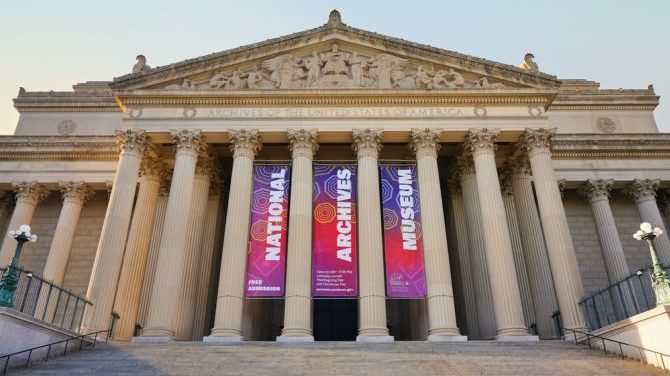When several people in Washington, D.C., for the March for Life visited the National Archives Museum last month they were taken aback when staff told them to cover up the pro-life messaging on their clothing or leave the building.
Today, National Archives administrators signed a legal agreement to ensure that such an incident won’t happen again and offered the plaintiffs a tour of the National Archives Museum as well as a personal apology.
Whether this agreement heads off litigation against the federally-funded museum remains to be seen. The plaintiffs had filed a suit Feb. 8 with the U.S. District Court for the District of Columbia, charging the National Archives with violating their First Amendment and Fifth Amendment rights as well as the federal Religious Freedom Restoration Act.
In signing a “consent decree,” the National Archives agreed to make clear that visitors are free to express their religious and political beliefs at the museum, which is home to original copies of the U.S. Constitution, the Bill of Rights, and the Declaration of Independence.
“The National Archives and Records Administration (NARA) represents that its policy expressly allows all visitors to wear T-shirts, hats, buttons, etc., that display protest language, including religious and political speech,” the agreement reads.
NARA also promised to communicate this policy “to all NARA security officers who interact with the public at every NARA facility, including the National Archives.”
In addition, NARA agreed to extend a personal apology and a personal tour to two of the plaintiffs who, the agreement stated, intend to pay a visit to the museum in the future.
NARA declined to comment on the agreement when contacted by CNA.
The American Center for Law and Justice (ACLJ), the legal firm representing the plaintiffs, issued a statement saying this is “a great first step and a win for our clients.”
“This doesn’t mean the case is over, as we will continue to get answers for our clients as to why it happened in the first place, and what corrective action the defendants will be taking to ensure that it never happens again to anyone wearing expressive religious and pro-life apparel at the National Archives. No one should be targeted by the federal government for their Christian and pro-life views,” the ACLJ statement said.
Olivia Summers, a senior litigation counsel with the ACLJ, told CNA the next step is to "move forward with the mitigation and the lawsuit."
"Obviously, this is only dealing with a small portion of the case overall," Summers continued.
Summers could not provide details on the discussions that led to the consent order, but said "they [NARA] are very open to working with us."
After the ACLJ announced its lawsuit earlier this month, the National Archives responded almost immediately with an apology: “As the home to the original Constitution and Bill of Rights, which enshrine the rights of free speech and religion, we sincerely apologize for this occurrence,” read the Feb. 10 statement.
In their press release today, the lawyers for the pro-life advocates said they weren’t satisfied with the museum’s apology.
“While the National Archives had previously issued an apology for the Jan. 20 incident, it had not provided any evidence of the existence of a policy or of sufficient training of its employees and officers with the apology sufficient to ensure that a repeat violation would not occur. As a result, the ACLJ’s clients remained fearful about returning to the building,” they said.
The law firm said that they then prepared a motion for a temporary restraining order against the museum. The prospect of that order, they said, paved the way to today’s agreement.
In a statement, the ACLJ noted that the signed agreement “is necessary here because two of our clients have plans to return to the National Archives soon — one as early as the end of this week — and we want to ensure that they are not targeted, humiliated, and silenced again during their visits.”
The two clients planning the visit were specifically named in the agreement and promised a tour of the museum along with a personal apology.
The following allegations are listed in the lawsuit against the National Archives:
- A group of Catholic students and their chaperones were allegedly asked to remove or cover up all pro-life messages. This included pro-life hats that read “life always wins” and another that had the inscription “ProLife.” A security officer allegedly ordered one person to zip up her jacket to cover a pro-life shirt and told her she could not unzip the jacket until she left the National Archives. The security officer also allegedly told students to remove pro-life buttons on their clothing.
- Another plaintiff, Wendilee Walpole Lassiter, a law school student at Liberty University, alleges that a security officer said she could not enter the building and was told “you have to take your shirt off [because] your shirt will incite others” and told her it would “cause a disturbance” and that she was “disturbing the peace.” She was wearing a sweatshirt that read “I am the post-Roe generation: law students for life,” according to the lawsuit. She complied with the order and alleged she saw people freely walking around the building with pro-abortion messages, such as “my body, my choice.”
- A third plaintiff, Terrie Kallal, who entered the National Archives with her granddaughter, wore a T-shirt that read “March 4 Life 2014: Saint Cecilia’s Youth Group, Glen Carbon, IL” and her granddaughter wore a shirt that read “pro-life generation,” according to the lawsuit. She alleges that a security officer told her that the clothing was “offensive” and that “you must zip up your coats or take off your shirts.” They complied with the order.

